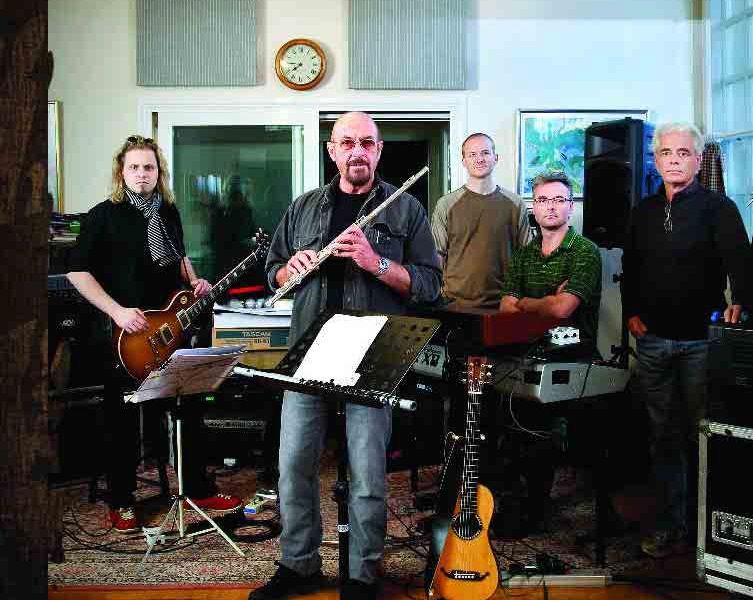A CONVERSATION WITH Ian Anderson, the flautist frontman of prog rock oddballs Jethro Tull, can be a disorienting experience. A 20-minute interview easily stretches into an hour and questions as seemingly innocuous as “What do you do to relax when not on tour?” elicit opinions on everything from overpopulation to groupies, from the dismal state of the Anglican Church to the “draconian” feed regulations constraining commercial salmon farmers.
Those familiar with Anderson’s music will not be surprised at the breadth of his interests or the passion of his opinions. While casual concert goers may become distracted by Jethro Tull’s theatrical stage shows, and Anderson’s tendency to play the flute standing on one leg like a possessed Elizabethan flamingo, true fans – who are many and diehard – are drawn to Anderson’s lyrics, which are sometimes confrontational and often inscrutable.
When we speak, Anderson is in his studio in England rehearsing for the tour and spending time with his granddaughter. Discussion about music and Jethro Tull history quickly gives way to the state of the world, religion and politics. When asked why he chose the flute he says he liked it “because it was shiny” and he could no longer afford the payments on his guitar. He doesn’t, it seems, have much to say about his chosen instrument.
Instead, the 65-year-old would like to talk about his grandchildren and what he sees as the biggest crisis facing the planet: overpopulation. “I have two children and two grandchildren and I hope it stops at that. I’m a passionate believer in responsible parenting, which means I’m really quite opposed in a moral sense to large families.”
Anderson is at pains to stress that he is not your typical rock star. “The last thing I wanted was half-naked girls running around doing whatever drugs they were doing,” he says. He says he has no use for drugs at all, although he admits he “used to smoke cigarettes” and still enjoys “a beer and a glass of whisky”.
Whatever wild days he may have had are behind him – Anderson says his friends these days are mainly “clergy, politicians, writers and farmers” – but when it comes to music he has no intention of slowing down. He thinks his rocking gets better as he ages: “I am much more moved by what I write today and play today than what I wrote back then. I was fumbling then. I’m an experienced musician now.”
Jethro Tull got their start in England in 1968. Anderson, who had been in bands toying with blues and soul music, wanted to try something entirely new to set himself apart from the welter of white blues bands in Britain. He succeeded.
In the intervening decades Jethro Tull would feature a perpetually shifting roster of musicians and explore music styles from jazz to folk rock, from world music to hard – or what is described on their website as “medium hard” – rock.
The band became famous for its theatrical stage shows and bizarre pseudo- historical costumes. Anderson’s stage persona was especially singular: he would perform dressed like a psychedelic Mercutio, his straggly shoulder-length hair going in all directions. Standing on one foot, wearing tights and a codpiece, flute proudly held high, he became the unofficial symbol of the band. Two of Jethro Tull’s biggest hits, Aqualung (1971) and Bungle in the Jungle (1974), show just how hard it is to categorise their sound.
Aqualung, a character sketch of a broken down and possibly paedophilic homeless person, is built around a heavy guitar line that makes it sound like an early Black Sabbath song. Bungle in the Jungle is a bouncy and eccentric flute-driven song replete with sound effects of lions roaring.
Perhaps Anderson’s style is ever- changing because he doesn’t actually listen to music himself. “I don’t want to dilute my music,” he explains. “I don’t pay attention to other people’s music and haven’t since my late teens or early 20s.”
Most the group’s tour is dedicated to theatrical performances of their 1972 concept album Thick as a Brick and Anderson’s solo follow-up Thick as a Brick 2: Whatever Happened to Gerald Bostock?
(2012). But Tull fans will be pleased to hear that the Hong Kong show will be one of a few special tour dates at which the band will play a retrospective set of its most popular songs. Anderson says the show features “the most loved and hated songs of my career”.
This trip will be Anderson’s second to Hong Kong, but don’t expect to see him on the tourist trail. He is a reluctant traveller who prefers a night in his own bed to a day in a faraway city. He has a “get in, do it and go home” approach to touring.
Still, he confesses, “It will be a shame not to see the enormous changes in Hong Kong over the past 20 years.”
Even though he has only been here once, he talks about seeing Hong Kong like seeing an old friend: “I think I’ll say, ‘Boy, you’ve grown taller!’”



